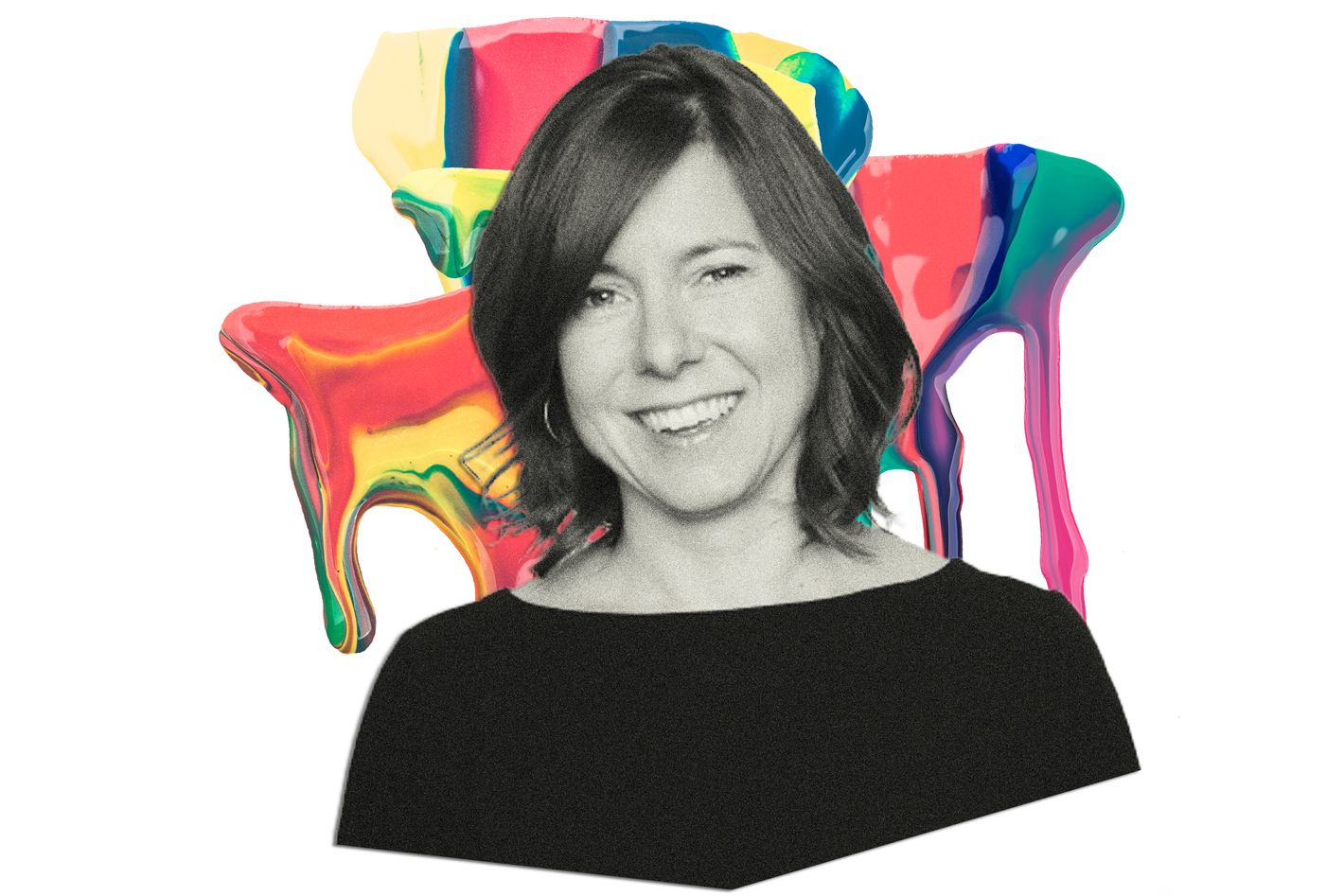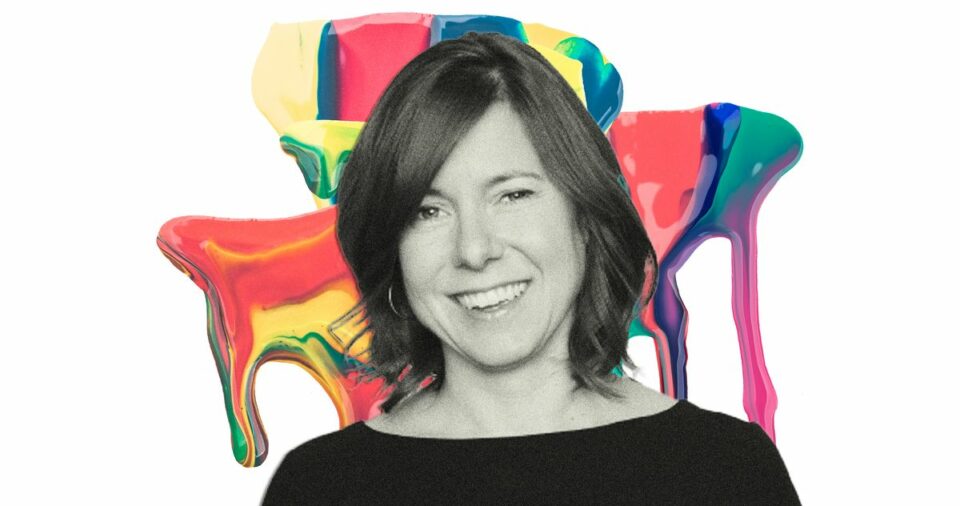[ad_1]

Last fall, Anna Sale found out she’d be losing her job. New York’s public radio station, WNYC, had canceled her popular podcast, Death, Sex & Money, as part of larger budget cuts. She had launched the show ten years ago, using her signature sensitivity to navigate uncomfortable conversations. But by 2023, podcasting had lost much of its golden-age shine. Sale wasn’t sure what would come next.
She held a wake-like event called Four Interviews and a Funeral to sunset the podcast and grieved for her long career in public radio, where she’d also worked as a political reporter. She had meetings with interested podcast networks, and in January, made a deal to keep hosting Death, Sex & Money on Slate. Then she had a month off to recharge. “I was really tired and exhausted,” she says. “I was aware that the inspiration well had run dry.” She went to the library, concerts, and museums — anything to fill her creative cup while keeping herself off Google docs and Instagram.
The podcast relaunched earlier this month; so far, Sale has interviewed a self-identified sociopath and had her own tarot cards read on-air. But she’s also contemplating how a podcast about human connection can address America’s polarization ahead of a contentious presidential election. “It’s a question of, ‘What’s our role?’” she says. “I don’t want our show to feel like we’re ignoring the places where there’s been a total breakdown.” Sale lives in Berkeley with her husband, two kids, two dogs, and three rats (more on them later), but the family also spends time in Wyoming. Here’s how she gets it done.
On her morning routine:
I am the first to rise in my family. I wake up around 6 a.m., let out the dogs, Lupine and Rosie, and make coffee. The reason I get up so early is that my colleagues are on the East Coast. For a working parent, being able to wake up before everybody else and get some key things done has been a savior. I write and read the news from 6 to 8 a.m. The decline of Twitter has forced me to be more intentional about the news that I have coming my way. Just reading the New York Times and the Washington Post, while living in the Bay Area, is not good enough. There’s this newsletter called California Sun — it’s ten stories across the state that are popping — and it makes me feel rooted in California in a way that no other media really does. Sometimes I’m doing really voice-y writing for a newsletter post. Sometimes I’m writing the top of an episode, making sure I’m really clear on the thesis of what is special about it. And then I’ll start writing emails.
On working remotely:
Since the pandemic, I work from home pretty much all the time. My colleagues are on the East Coast. On the domestic front, it’s made my life so much more manageable. I can listen to an episode draft on Monday morning while I’m folding the laundry that didn’t get done over the weekend. I just miss having co-workers. I like working around people who are at different stages of their career. It makes you aware of pop culture that you otherwise wouldn’t hear about.
I try to have actual human contact with the people I work closest with on my team. There’s a thing I do, which I think is very specific to the fact that I’m on the Gen X–millennial cusp. If someone who I haven’t talked to in a while sends me something that makes me smile, I will directly dial them back and see if they pick up the phone. I know it’s horrifying for people, but I just do a five-minute, “Oh my God, I love that you sent me this picture!”
On getting people to open up:
My gift, for whatever reason, is being able to quickly figure out a pathway to connect with somebody. I grew up in West Virginia, in a town of about 50,000, where you visit with people when you see them. That just doesn’t happen in the part of the Bay Area where I live. It was modeled for me how to just ask that first question, about the weather or the Mountaineer football team, to create a way in. Another really important training ground was covering politics. I’d grab voters and have to explain, “Here’s why I want to talk to you.” It forced me to get over the social anxiety of starting a conversation with a stranger.
I’ve learned the most about interviewing from having conflict with my husband and seeing how we unpack things together. He likes to dig in. He’s not conflict-avoidant at all. What I’m interested in now is not pushing and pushing to see if I can make the person go into a deep emotion. I’m a journalist; I’m neither a therapist nor in it to make people just feel really raw things. If I notice something, I’ll sort of pull back and then we talk about what might be happening.
On being interviewed herself:
I feel more uncomfortable than I ever do when I’m being interviewed. I feel vulnerable and exposed and aware that I don’t get to edit this. I feel nervous that with my instinct of connecting and sharing, I’m going to say something a little too candidly, or expose something private about my family that I wish I’d been more vague about. Our episode this week starts with a tarot reading that I did with a witch. There’s some moments in the tape where I feel like she’s got my number on some things that I feel sort of embarrassed by, because they’re cliché.
On the hardest topic to discuss with guests:
It used to be money. Ten years ago when I was in the active stages of trying to figure out the building blocks of our life, I had a lot of money anxiety. It’s not gone, but I’ve gotten a little bit better about breathing through it. Conversations about grief used to be more of a curiosity to me. But as people I love age and decline, it’s less intellectually stimulating and more dread-inducing. The most troubling thing is encountering profound aloneness in a person. I can’t fix it. Anything I would offer to try to sound soothing will sound pat. We need other people, and those relationships take time to build. So when someone sounds profoundly alone, it sticks with me for years and years and I wonder about them.
On welcoming rats into her home:
Over the Christmas break in Wyoming, we found a wounded vole and brought him home. A few months ago, he died, and the kids were really sad when we said good-bye to Chico. So my husband and my 7-year-old started researching rodent pets, and they discovered that rats are very smart. You can train them to play basketball or paint with a Q-tip. The one downside is they’re very social, and so you can’t get just one or they get depressed. We went down to a rodent breeder in Santa Cruz a few weekends back and welcomed three male rats into our family. Their names are Mango, Poppy, and Pinky (but Pinky might also be Oreo; we’re still debating it). They will sit on your shoulder and cuddle you. You really can’t do two things at once when you’re holding them or they’ll scamper off.
On setting boundaries:
A few days a week, I pick my kids up from school at 3:10 p.m., so I have a hard out. That doesn’t necessarily help me take care of myself, but it makes me turn the page. I’m trying to feel more connected to friends and colleagues. I’m trying to have fun. At the end of the day, I’m really trying to be intentional about what I let myself flip through and think about. If I do have something that’s troubling me, I will think about something wild that my 5-year-old said or that the rats did. Rats might be the key to it all.
On the people who help her get it done:
We hire wonderful teenage babysitters when we’re in Wyoming during the summertime. We’ve had the same young women doing it for a few summers running now. My husband’s dad and stepmom also live in Wyoming, and they help in all sorts of ways big and small. During the school year, we don’t have family nearby. The kids do aftercare at their school a few afternoons a week, and we have a bench of UC Berkeley undergrads and high-school students who do babysitting when we have a date night or evening thing. Last night, a high-schooler was here while saw Willie Nelson at the Greek Theatre in Berkeley — an excellent show!
On letting go of perfectionism:
My working style was very focused on everything from the big picture to the smallest edit. I’ve lightened up on my perfectionist tendencies. I’ve had to ask myself, “What am I going to let go of being micro-focused on? And what am I going to focus on instead?” When I feel thrown off, or I feel insecure, that’s when I have to say, “The dogs are telling me they need to go for a walk outside, and on that walk, I’m going to listen to a comedy podcast instead of listening to a third draft of an episode.” I have to make different choices. Part of it is happening because of the required humility of being a mother. I can see how on a particular day, I was doing the best that I could. If it wasn’t good enough, I can come back and try again.
[ad_2]
Angelina Chapin , 2024-04-29 13:00:06
Source link



